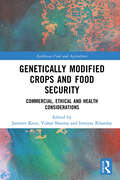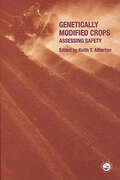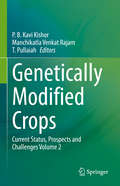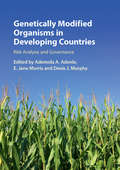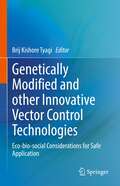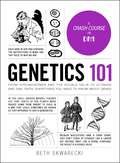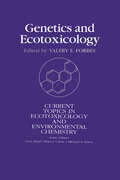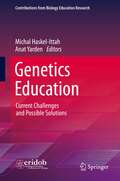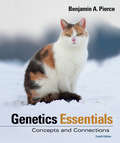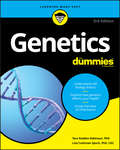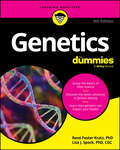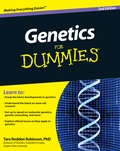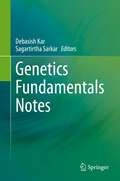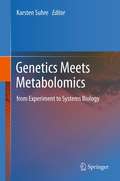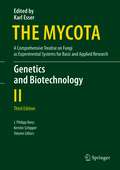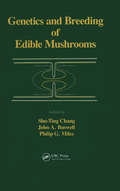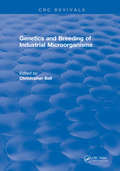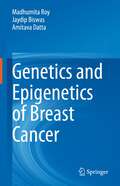- Table View
- List View
Genetically Engineered Toxins
by Arthur E. FrankelPresenting all preclinical and clinical information available on genetically engineered toxins, this unique, single-source reference provides the most up-to-date methods and practical examples for conducting clinical studies in toxin molecular biology.;Reviewing difficult problems and their solutions, Genetically Engineered Toxins discusses techniques for clo;ning, expressing, and purifying recombinant toxins and genetically modified recombinant toxins; documents structure-function relationships in toxins, including comparative information; supplies theory and illustrations of chimeric toxins; delineates the preclinical assessments of new reagents; and summarizes approaches to drug design.;With over 1100 literature citations, Genetically Engineered Toxins is an invaluable resource for biochemists, molecular biologists, biotechnologists, pharmacologists, toxicologists, X-ray crystallographers, enzymologists, oncologists, hematologists, immunologists, rheumatologists, botanists, and graduate-level students in molecular biology, biotechnology, and clinical oncology courses.
Genetically Engineered Viruses: Development and Applications
by Christopher J. A. Ring Edward D. BlairThis book combines an up-to-date summary of how best to genetically engineer viruses with an overview of basic virology. This unique combination makes it an invaluable research tool for virologists and molecular biologists seeking to exploit viruses for a range of applications. Written by highly respected authors, the book also provides comparisons to and guidelines for the use of viruses in difference applications.
Genetically Incorporated Non-Canonical Amino Acids: Methods and Protocols (Methods in Molecular Biology #2676)
by Yu-Hsuan Tsai Simon J. ElsässerThis detailed volume explores non-canonical amino acids (ncAAs) through their site-specific incorporation by genetic code expansion (GCE). The collection provides a broad resource of methods for implementing GCE in E. coli, mammalian cells, and animals, highlighting specific applications ranging from fluorescence labeling to photocontrol and the study of protein post-translational modification. Written for the highly successful Methods in Molecular Biology series, chapters include introductions to their respective topics, lists of the necessary materials and reagents, step-by-step and readily reproducible laboratory protocols, and tips on troubleshooting and avoiding known pitfalls. Authoritative and practical, Genetically Incorporated Non-Canonical Amino Acids: Methods and Protocols serves as an ideal source of methodologies that can be adapted and extended, migrated to different model systems, and combined in new ways to help explore a wide range of biological questions and to augment industrial and pharmaceutical protein engineering.
Genetically Modified Crops and Food Security: Commercial, Ethical and Health Considerations (Earthscan Food and Agriculture)
by Vishal Sharma Jasmeet Kour Imtiyaz KhandayThis book reviews a wide-range of genetically modified (GM) crops to understand how they are produced, the impacts on the agricultural industry, and their potential for improving food security. The production of GM crops has now become an invaluable asset in the agricultural toolbox. With a significant portion of the world suffering from hunger and poverty, this book examines how food security can be achieved through GM crops. A wide variety of crops are examined, from the earliest developments of GM tomatoes and potatoes to recent interest in the development of low-cost, high yielding biofuels, such as microalgae. Chapters also discuss the role of GM crops in pest management and the consequential reduction in the use of insecticides. Overall, this book provides an important synthesis of GM crops from their commercial value to the agricultural industry, as well as their potential for improving food security. This book will be of great interest to students and scholars of agricultural engineering, crop science, food biotechology, food security, and those interested in food and agriculture and sustainable development more broadly.
Genetically Modified Crops: Assessing Safety
by Keith T. AthertonBiotechnology has a significant impact on both medicine and agriculture. With the introduction of new products to the marketplace, the safety of those products is of paramount importance. New safety evaluation strategies are now employed to ensure that the consumer is adequately protected. This book describes those strategies and addresses some of
Genetically Modified Crops: Current Status, Prospects and Challenges Volume 1
by T. Pullaiah P. B. Kavi Kishor M. V. RajamGenetic transformation is a key technology, in which genes are transferred from one organism to another in order to improve agronomic traits and ultimately help humans. However, there is apprehension in some quarters that genetically modified crops may disturb the ecosystem. A number of non-governmental organizations continue to protest against GM crops and foods, despite the fact that many organisms are genetically modified naturally in the course of evolution. In this context, there is a need to educate the public about the importance of GM crops in terms of food and nutritional security. This book provides an overview of various crop plants where genetic transformation has been successfully implemented to improve their agronomically useful traits. It includes information on the gene(s) transferred, the method of gene transfer and the beneficial effects of these gene transfers and agronomic improvements compared to the wild plants. Further, it discusses the commercial prospects of these GM crops as well as the associated challenges. Given its scope, this book is a valuable resource for agricultural and horticultural scientists/experts wanting to explain to the public, politicians and non-governmental organizations the details of GM crops and how they can improve crops and the lives of farmers.
Genetically Modified Crops: Current Status, Prospects and Challenges Volume 2
by Manchikatla Venkat Rajam T. Pullaiah P. B. Kavi KishorGenetic transformation is a key technology, in which genes are transferred from one organism to another in order to improve agronomic traits and ultimately help humans. However, there is concern in some quarters that genetically modified crops may disturb the ecosystem. A number of non-governmental organizations continue to protest against GM crops and foods, despite the fact that many organisms are genetically modified naturally in the course of evolution. In this context, there is a need to educate the public about the importance of GM crops in terms of food and nutritional security. This book provides an overview of various crop plants where genetic transformation has been successfully implemented to improve their agronomically useful traits. It includes information on the gene(s) transferred, the method of gene transfer and the beneficial effects of these gene transfers and the agronomic improvements compared to the wild plants. Further, it discusses the commercial prospects of these GM crops as well as the associated challenges. Given its scope, this book is a valuable resource for agricultural and horticultural scientists/experts wanting to explain to the public, politicians and non-governmental organizations the details of GM crops and how they can improve crops and the lives of farmers. It also appeals to researchers and postgraduate students.This volume focuses on the transgenics of mungbean, cowpea, chickpea, cotton, mulberrry, Jatropha, fingermillet, papaya, citrus plants and cassava. It also discusses CRISPR edited lines.
Genetically Modified Mosquitoes for Malaria Control
by Christophe BoeteDespite a century of research and attempts to control one of the deadliest foes of mankind, the malaria situation remains a major public health problem. Obviously biological explanations (the resistance of parasites and mosquitoes against available drugs and insecticides respectively) are often given, but they remain partial and incomplete. Indeed,
Genetically Modified Organisms in Developing Countries: Risk Analysis and Governance
by Murphy Morris Adenle Ademola A. E. Jane Denis J."Bringing together the ideas of experts from around the world, this incisive text offers cutting-edge perspectives on the risk analysis and governance of genetically modified organisms (GMOs), supporting effective and informed decision-making in developing countries. Comprised of four comprehensive sections, this book covers: Integrated risk analysis and decision making, giving an overview of the science involved and examining risk analysis methods that impact decision-making on the release of GMOs, particularly in developing countries. Diversification of expertise involved in risk analysis and practical ways in which the lack of expertise in developing countries can be overcome. Risk analysis based regulatory systems and how they can be undermined by power relationships and socio-political interests, as well as strategies for improving GMO policy development and regulatory decision-making. Case studies from developing countries providing lessons based on real-world experience that can inform our current thinking"--Provided by publisher.
Genetically Modified Organisms, Grade 7: STEM Road Map for Middle School (STEM Road Map Curriculum Series)
by Carla C. Johnson Erin E. Peters-Burton Janet B. WaltonWhat if you could challenge your seventh graders to become informed citizens by analyzing real-world implications of GMOs? With this volume in the STEM Road Map Curriculum Series, you can! Genetically Modified Organisms outlines a journey that will steer your students toward authentic problem solving while grounding them in integrated STEM disciplines. Like the other volumes in the series, this book is designed to meet the growing need to infuse real-world learning into K–12 classrooms. This interdisciplinary, five-lesson module uses project- and problem-based learning to help students investigate the opportunities and challenges of GMO production and consumption. Working in teams, students will create a documentary communicating the health, social, and economic aspects of GMO production and consumption. To support this goal, students will do the following: • Use the Internet and other sources to build knowledge of an issue, and recognize and value stakeholders and their viewpoints in an issue. • Explore the relationship among local, state, and federal legislation related to GMOs. • Understand the role of cost-benefit analysis in making informed economic decisions. • Develop skills to evaluate arguments, create and communicate individual understanding and perspectives. • Gain a deeper understanding that structure and function are related by examining plants and how the environment and genetics influences structure. • Gain a better understanding of what tools humans have developed to genetically alter organisms for human benefit. The STEM Road Map Curriculum Series is anchored in the Next Generation Science Standards, the Common Core State Standards, and the Framework for 21st Century Learning. In-depth and flexible, Genetically Modified Organisms can be used as a whole unit or in part to meet the needs of districts, schools, and teachers who are charting a course toward an integrated STEM approach.
Genetically Modified Organisms: Transgenesis in Plants
by Yves TourteThis work reviews the theoretical and historical basis of genetic engineering, particularly in regard to genetically modified plants, and details techniques of creating genetically modified organisms. It describes research programs and results in areas such as agro-food, health, and the environment, and examines practical, legal, and ethical questions posed by society and the responses of scientists, legislators, and industry. B&W photographs of equipments are given.
Genetically Modified and other Innovative Vector Control Technologies: Eco-bio-social Considerations for Safe Application
by Brij Kishore TyagiThis book comprehensively covers the latest development in developing and deploying the genetically modified vectors, particularly Anopheles and Aedes mosquitoes responsible for transmitting malaria parasites and dengue viruses, the most deadly and/or debilitating among all the vector-borne diseases. It is considered timely and commensurate to bring about a book dealing with the various ecological, biological and social as well as regulatory aspects for the deployment of genetically modified vectors in special context with the biosafety of humans, his associates, and the environment. Written by an array of specialists and experts in various subjects of genetically modified organisms, this book centrally addresses the (i) basic principles of the genetic manipulation of vectors and they are potential impact on human and the environment, (ii) ecological, biological, ethical, legal and social implications of the use of genetically modified vectors, (iii) identification of potential hazards; assessment and management of risks for human and environment; risk/benefit analysis, (iv) principles and practices for the assessment and management of biosecurity and biosafety in laboratories (and in the field), (v) guiding principles for creation and management of institutional or national biosafety review boards and ethics review committees, and (vi) development and application of a biosafety regulatory framework and its related legal principles at national levels for securing the development and use of vector control methods based on genetic modification strategies. This publication will be useful to researchers, scientists, and professionals engaged in academic and research institutions, government or non-government, as well as students in universities and medical colleges.
Genetics 101: From Chromosomes and the Double Helix to Cloning and DNA Tests, Everything You Need to Know about Genes (Adams 101)
by Beth SkwareckiA clear and straightforward explanation of genetics in this new edition of the popular 101 series. Our genetic makeup determines so much about who we are, and what we pass on to our children—from eye color, to height, to health, and even our longevity. Genetics 101 breaks down the science of how genes are inherited and passed from parents to offspring, what DNA is and how it works, how your DNA affects your health, and how you can use your personal genomics to find out more about who you are and where you come from. Whether you’re looking for a better scientific understanding of genetics, or looking into your own DNA, Genetics 101 is your go-to source to discover more about both yourself and your ancestry.
Genetics And Ecotoxicology
by Valery E. ForbesThis first volume in the series provides a detailed treatment in ecotoxicology and stresses why genetics is important in understanding if and how chemical contaminants affect populations. Written by an array of international contributors from various fields covering mammals, invertebrates, fish, plants, as well as molecular ecotoxicology, this book considers both ecological/evolutionary consequences and practical implications of the interplay between chemical toxicants and the genetic population.In broadening the understanding of ecological response, this resource ranges from molecular to classical genetics, from plant to animal, from asexual to sexual, touching on some fundamental issues of evolutionary biology. In addition, gaps in our present understanding of genetic and ecotoxicological processes and future research directions have been identified.
Genetics Education: Current Challenges and Possible Solutions (Contributions from Biology Education Research)
by Anat Yarden Michal Haskel-IttahThis edited volume presents the current state of the art of genetics education and the challenges it holds for teaching as well as for learning. It addresses topics such as how genetics should be taught in order to provide students with a wide and connected view of the field. It gives in-depth aspects that should be considered for teaching genetics and the effect on the student’s understanding. This book provides novel ideas for biology teachers, curriculum developers and researchers on how to confront the presented challenges in a way that may enable them to advance genetics education in the 21st century. It reviews the complexity of teaching and learning genetics, largely overlooked by biology textbooks and classroom instruction. It composes a crucial component of scientific literacy.
Genetics Essentials: Concepts And Connections
by Benjamin A. PierceDerived from his popular and acclaimed Genetics: A Conceptual Approach, Ben Pierce’s streamlined text covers basic transmission, molecular, and population genetics in just 18 chapters, helping students uncover major concepts of genetics and make connections among those concepts as a way of gaining a richer understanding of the essentials of genetics. <p> With the new edition, Ben Pierce again focuses on the most pervasive problems for students taking genetics—understanding how genetics concepts connect to each other and developing solid problem solving skills. There is updated coverage of important research developments in genetics (CRISPR) and a new Active Learning feature, Think, Pair, Share. And with this edition, Genetics Essentials is available as a fully integrated text/media resource with SaplingPlus, an online solution that combines an e-book of the text, Pierce’s powerful multimedia resources, and Sapling’s robust genetics problem library.
Genetics For Dummies
by Tara Rodden Robinson Lisa SpockYour no-nonsense guide to genetics With rapid advances in genomic technologies, genetic testing has become a key part of both clinical practice and research. Scientists are constantly discovering more about how genetics plays a role in health and disease, and healthcare providers are using this information to more accurately identify their patients' particular medical needs. Genetic information is also increasingly being used for a wide range of non-clinical purposes, such as exploring one's ancestry. This new edition of Genetics For Dummies serves as a perfect course supplement for students pursuing degrees in the sciences. It also provides science-lovers of all skill levels with easy-to-follow and easy-to-understand information about this exciting and constantly evolving field. This edition includes recent developments and applications in the field of genetics, such as: Whole-genome and whole-exome sequencing Precision medicine and pharmacogenetics Direct-to-consumer genetic testing for health risks Ancestry testing Featuring information on some of the hottest topics in genetics right now, this book makes it easier than ever to wrap your head around this fascinating subject.
Genetics For Dummies
by Rene Fester Kratz Lisa SpockEvolve your knowledge of the fast-moving world of genetic research Genetics For Dummies shines a light on the fascinating field of genetics, helping you gain a greater understanding of how genetics factors into everyday life. Perfect as a supplement to a genetics course or as an intro for the curious, this book is packed with easy-to-understand explanations of the key concepts, including an overview of cell biology. You’ll also find tons of coverage of recent discoveries in the field, plus info on how genetics can affect your health and wellbeing. Whole-genome sequencing, genetic disease treatments, exploring your ancestry, non-invasive prenatal testing—it’s all here, in the friendly and relatable Dummies style you love. Grasp the basics of cell biology and get a primer on the field of genetic research Discover what you can learn about yourself, thanks to advances in genetic testing Learn how your genes influence your health and wellbeing, today and as you age Follow along with your college-level genetics course—or refresh your knowledge—with clear explanations of complex ideasGenetics For Dummies is great for students of the biological sciences, and for the genetically curious everywhere.
Genetics For Dummies
by Tara Rodden RobinsonA plain-English guide to geneticsWant to know more about genetics? This non-intimidating guide gets you up to speed on all the fundamentals and the most recent discoveries. Now with 25% new and revised material, Genetics For Dummies, 2nd Edition gives you clear and accessible coverage of this rapidly advancing field.From dominant and recessive inherited traits to the DNA double-helix, you get clear explanations in easy-to-understand terms. Plus, you'll see how people are applying genetic science to fight disease, develop new products, solve crimes . . . and even clone cats.Covers topics in a straightforward and effective mannerIncludes coverage of stem cell research, molecular genetics, behavioral genetics, genetic engineering, and moreExplores ethical issues as they pertain to the study of geneticsWhether you?re currently enrolled in a genetics course or are just looking for a refresher, Genetics For Dummies, 2nd Edition provides science lovers of all skill levels with easy-to-follow information on this fascinating subject.
Genetics Fundamentals Notes
by Debasish Kar Sagartirtha SarkarThis up-to-date and comprehensive textbook is essential reading material for advanced undergraduate and graduate students with a course module in genetics and developmental biology. The book provides clear, concise, and rigorous foundational concepts of genetics. It opens with an introductory chapter that provides an overview of genetics. The book includes separate and detailed sections on classical genetics, molecular genetics, and population genetics. It covers basic and foundational principles such as Mendelian genetics, chromosomal theory, transcription, translation, mutation, and gene regulation. It further includes chapters on advanced topics such as molecular genetic techniques, genomics, and applied molecular genetics. The concluding section includes chapters on population genetics, developmental genetics, and evolutionary genetics. The chapters are written by authors with in-depth knowledge of the field. The book is replete with interesting examples, case studies, questions and suggested reading. It is useful to students and course instructors in the field of human genetics, developmental biology, life sciences, and biotechnology. It is also meant for researchers who wish to further their understanding about the fundamental concepts of genetics.
Genetics Meets Metabolomics
by Karsten SuhreThis book is written by leading researchers in the fields about the intersection of genetics and metabolomics which can lead to more comprehensive studies of inborn variation of metabolism.
Genetics and Biotechnology (The Mycota #2)
by J. Philipp Benz Kerstin SchipperThis fully revised third edition includes up-to-date topics and developments in the field, which has made tremendous strides since the publication of the second edition in 2004. Many novel techniques based on Next Generation Sequencing have sped up the analysis of fungi and major advances have been made in genome editing, leading to a deeper understanding of the genetics underlying cellular processes as well as their applicability. At the same time, the relevance of fungi is unbroken, both due to the serious threats to human health and welfare posed by fungal pests and pathogens, and to the many benefits that fungal biotechnology can offer for diverse emerging markets and processes that form the basis of the modern bioeconomy. With regard to these advances, the first section of this volume, Genetics, illustrates the basic genetic processes underlying inheritance, cell biology, metabolism and “lifestyles” of fungi. The second section, Biotechnology, addresses the applied side of fungal genetics, ranging from new tools for synthetic biology to the biotechnological potential of fungi from diverse environments. Gathering chapters written by reputed scientists, the book represents an invaluable reference guide for fungal biologists, geneticists and biotechnologists alike.
Genetics and Breeding of Edible Mushrooms
by A.C. ChangThis text not only explores the breeding problems for Agaricus bisporus, the button mushroom, but approaches the subject in the context of the large range of edible mushrooms which are currently under commercial cultivation worldwide. From the background and general objectives of culture collection and breeding to the genetic systems of edible mushrooms and the molecular biological approaches to breeding, the coverage is in-depth and current. The applications of breeding programmes for specific purposes, including provision of a food source, production of high value fungal metabolites and upgrading of lignocellulosic wastes and wastewater treatment are also discussed.
Genetics and Breeding of Industrial Microorganisms
by Christopher BallThis text provides a clear exposition of genetic principles and problems with comprehensive, up-to-date references. Specialists who have collaborated closely with industry give an inside authentic view of the genetics and breeding of industrial microorganisms such as yeasts, filamentous fungi, actinomycetes, pseudomonads, and other bacteria of major industrial significance. This book will be especially valuable to many professionals in the field of microbial genetics.
Genetics and Epigenetics of Breast Cancer
by Amitava Datta Madhumita Roy Jaydip BiswasThis book discusses the contribution of genetics and epigenetics alterations in the initiation, development, and recurrence of breast cancer. It also reviews the potential of translating the epigenetic alterations into diagnosis, prognosis, and breast cancer therapy. The initial chapters explore the epigenetics, etiology, and conventional treatment strategies for breast cancer. The subsequent chapters discuss the genetic landscape and cover three main epigenetic modulation mechanisms; histone modification, DNA methylation, and miRNA silencing. Further, the book explores the potential of epigenetic drugs in treating breast cancer. Lastly, it covers the phytochemicals targeting epigenetic modulators in breast cancer treatment. This book is an essential source for researchers and practitioners interested in exploring the potential of epigenetics modulators in breast cancer treatment.



